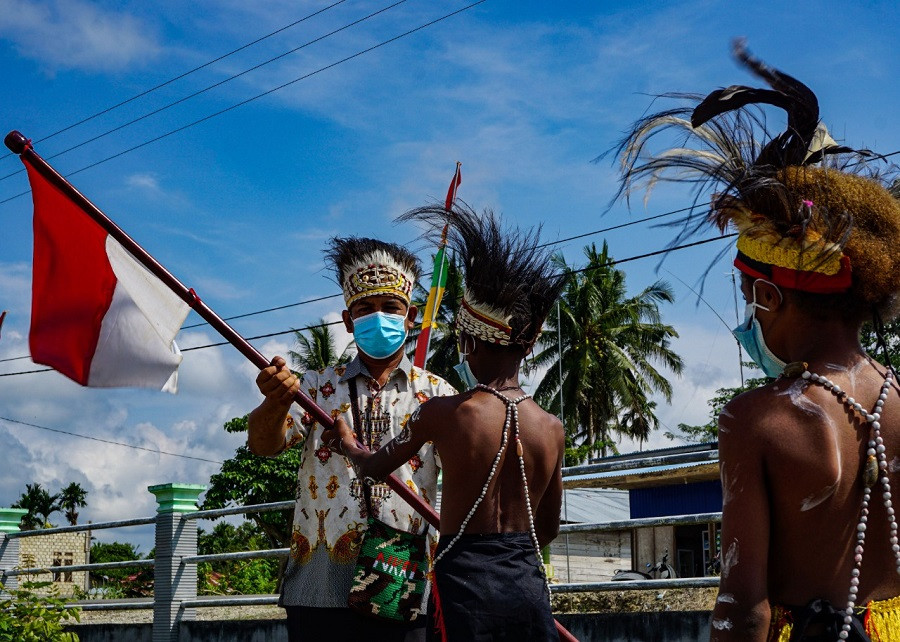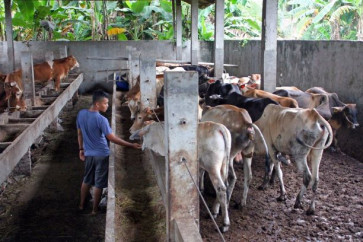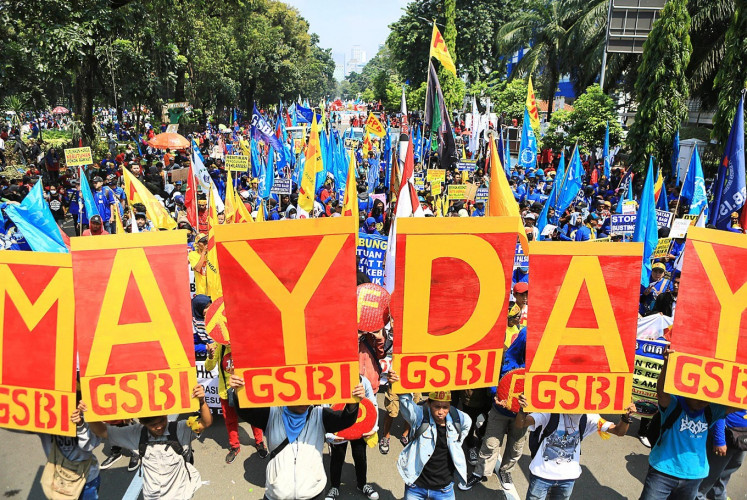50 years LP3ES, 76 years Indonesia: Quo vadis?
Regeneration is an important issue for LP3ES now to be able to maintain the legacy that was inherited by the founders and has been maintained for the past 50 years.
Change text size
Gift Premium Articles
to Anyone

W
hat does it mean to turn 50? Many things, depending on your outlook. You could feel that more than half of your life has gone by, time and age is creeping up on you, but you are too set in your ways, so you basically do things you have always done until you kick the bucket.
On the other hand, you could see it as a time for change: to create new opportunities and set new goals for the next 50 years in order to remain relevant and meaningful in an ever-changing world.
The Institute for Research, Education and Information on Economy and Social Affairs, better known by its acronym LP3ES, will turn 50 tomorrow. Congratulations! Let’s hope LP3ES chooses the second option for its next 50 years!
It was founded on Aug. 19, 1971, by a group of student intellectuals and activists, who felt there was a need for an alternative approach to national development, to develop welfare values, social justice and democracy.
LP3ES is a non-profit NGO which has four pillars of activity: research; education and community development; publishing; and overseas network development. In the terms of reference for its 50th anniversary activities, it states, “These four pillars have existed since LP3ES was established, still exist today and will be maintained in the future. For this reason, regeneration is an important issue for LP3ES now to be able to maintain the legacy that was inherited by the founders and has been maintained for the past 50 years, to be continued later in the years to come.
In 1972, it started publishing Prisma, which covers sociopolitical and economic issues, and is read by academics, students, government officials, policymakers, etc. It was the go-to popular academic journal, which was considered so cool to have, that students would put an issue of Prisma on the top of the pile of books they carried on campus. It was considered a kind of status symbol to be reading Prisma!
To look at the list of people involved with LP3ES is like reading the names of the crème de la crème of Indonesian intelligentsia. In an essay he wrote for the 49th anniversary of LP3ES, Fachry Ali, a senior researcher at LP3ES listed among others these names: Ismid Hadad, Dawam Rahardjo, Daniel Dhakidae, Aswab Mahasin, Soedjatmoko, Taufik Abdullah, Nono Anwar Makarim, SB Judono, Dorodjatun Kuntjara-Jakti, Arief Budiman, Adnan Buyung Nasution, Harlan Bekti, Jusuf Ronodipuro, Sjahrir, Abdullah Sjarwani, Manuel Kaisiepo, Rustam Ibrahim, Abdurrahman Wahid, Ong Hok Ham, Farhan Bulkin, Ismed Natsir, Djohan Effendi and Vedi Hadiz. As if this was not enough, these figures were backed by intellectual giants like Emil Salim and Sumitro Djojohadikusumo. There is only one thing “wrong” with this list: no women!
What gives LP3ES?? Is sexism well and alive in LP3ES as it is in the academic and NGO world in general? This really has to change (if LP3ES is serious in its claims of democratization) as women are – in the words of American author Sheryl WuDunn in her 2010 TED Talk - “our century’s greatest injustice”.
So what does LP3ES plan to do for its 50th anniversary? The aim is to engage in a “critical reflection on the current state of the nation and assess the role of intellectuals … [and]… the role of LP3ES, in contributing to building the future of the nation and state”.
The activities leading up to the 50th anniversary have been many, including the publication of four books, three on LP3ES and an anthology “Democracy without Demos: Reflection of 100 Social and Political Scientists on Democratic Regression in Indonesia”. Without belittling the other activities, I would probably consider the most important the LP3ES School of Democracy, which has been held twice in 2020 and once in 2021.
Luckily, LP3ES is taking the issue of regeneration seriously – its youngest member is 24 and the fifth generation (as depicted in its “Who’s Who in LP3ES” book), includes more women. Still not enough, but hopefully there will be more in the future, as well as the development of a gender perspective in the work of LP3ES in general, as it’s not just about numbers.
I have witnessed some of these young women academics in action in the LP3ES webinars: they are impressive! And they keep to time, unlike the crusty old LP3ES men who tend to go on and on, and the much younger moderator is at a loss how to keep them to their 15-minute limit!
The climax of the LP3ES 50th anniversary will be a day-long webinar which lasts from at 8:30 a.m. to 4:00 p.m. For the general public, the afternoon session (12:30 p.m. to 3:15 p.m.) may be the most interesting as it is a bilingual panel discussion titled “Reflections on Indonesian Democracy” by well-known Indonesianists such as Eve Warburton (Australia), Olle Tornquist (Sweden), Dirk Tomsa (Australia), Andreas Uffen (Germany), Jeffrey Winters (United States), Yatun Sastramidjaja (Amsterdam) and Ward Berenshot (The Netherlands).
The moderators will be Aisyah Putri Budiati (associate researcher at LP3ES) and Wijayanto, who is the director of the Centre of Media and Democracy, director of LP3ES School of Democracy, editor of “Democracy without Demos”, and involved in so many activities related to the LP3ES 50th anniversary that I wonder if he has time to sleep! He is definitely one of the rising stars of LP3ES – if he doesn’t burn out!
The final event of the LP3ES 50th birthday event is the launch of “Democracy without Demos” and the closing of the School of Democracy. What a line-up, right?
Two days before LP3ES’ 50th, on Aug. 17, Indonesia celebrated its 76th Independence Day – like last year, a very low key one.
Four activists (one man, three women) – Ilhamsyah, head of the Confederation of the Struggle of Indonesian Laborers, Asfinawati, head of the Legal Aid Foundation, Nining Elitos, head of the Confederation of the Alliance of Workers of Indonesia, and Mutiara Ika, head of Perempuan Mahardhika (a woman’s NGO), gave their reflections on what independence means to them. It means freedom from oppression, injustice, exploitation, discrimination, poverty, corruption, the silencing of freedom of expression, land grabbing, criminalization of the poor or victims (of anything), sexism, sexual exploitation and violence, exploitation of nature and of course, freedom from the pandemic. They observe, we are far from having these freedoms, in fact, things have worsened.
This is the context that LP3ES has to work in for the next 50 years. In terms of climate change, we are facing “code red for humanity”. The recent takeover of Afghanistan by the Taliban may embolden other radicals worldwide, and have global implications, including for Indonesia of course.
Oh well, we have a 50th anniversary to celebrate tomorrow. Let’s focus on that for now, shall we?
***
The writer is the author of Julia’s Jihad.









